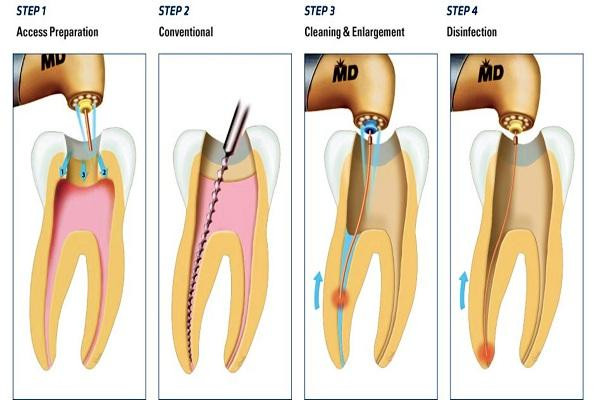When dentists broke the news that you are a viable candidate for a 'root canal,' you may have asked two raging questions: "Is it painful?" and "Why do I need it?"
After all, the name of the procedure itself sounds excruciating - both physically and financially. Truth is, a Root Canal Treatment is the safest way to alleviate the pain brought by internal infection and inflammation of the tooth pulp.
When the insides of a tooth become damaged by decays, injuries, and wrong placement of fillings, the nerves would start to degenerate. Over time, the tissues die and gangrene develops. The root canal then becomes vital in stopping the infection before it becomes worse. There is no need to worry about twinges and aches as recent innovations in dentistry made this particular treatment quick and pain-free.
When you need a root canal?
The signs that point to the necessity of this root canal procedure actually vary. Some patients may feel a sharp pain when pressure is applied to the tooth in cases of biting, chewing, or tapping. Others may experience lingering pain after the tooth is subjected to cold or hot foods. The symptoms may also manifest in the guise of abscesses and tendering of the gum tissues around the infected tooth.
Note, however, that the occurrence of these signs does not necessarily entail you to run to the emergency dentist and request for a root canal. It is imperative to observe whether the swelling goes away after some time. When the symptoms persist, it is high time to get professional help.
How are root canal treatments performed?
The Root Canal Specialist Near Me start by administering a local anesthetic on the infected tooth as well as its surrounding areas. After several minutes, a small opening is "drilled" on the tooth's chewing surface. This will serve as the exhaust or passage of the dead tissues that will be removed. This is also where the dentists can disinfect the insides of the tooth. After ensuring that the infection is cleared out, the "drilled" passage will be sealed with 'biocompatible filling materials.'
Do you really need a root canal?
If you refuse to undergo the treatment, you may opt to have the tooth extracted and replaced by an implant. This is, of course, more painful and expensive.
Rather than finding an alternative, it is best to ask the dentist near me for other methods that may prevent the need for a root canal. It helps to know that such treatments are not necessary when the problem is concentrated on gum abscess. This kind of infection can be healed with non-invasive procedures and self-medication.
The treatment may only be carried out when you are suffering from nerve abscesses. That is, the infection has already reached the interiors of the teeth and gum tissues started degenerating. As such, it best to insist on a thorough diagnosis before agreeing with what the dentist is proposing. If possible, it is best to have the tooth tested by an electronic nerve tester for Root Canal After Care.
